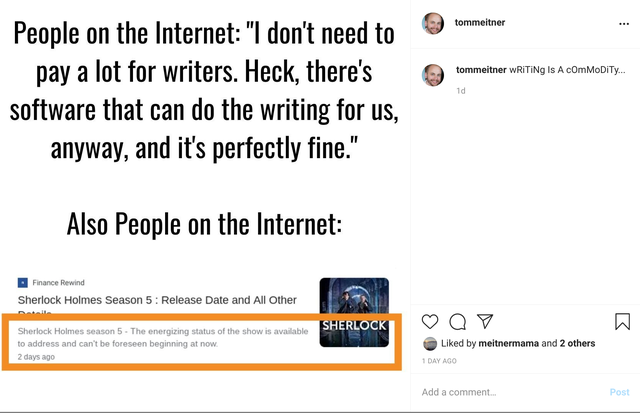
It almost sounds quaint: working at a company for 40 years and then retiring.
But for decades, this is how most people worked. You started in the mail room and worked your way up the company. Eventually, you’d be in a higher position with decent pay. The company would take care of you, and you would remain loyal to the company.
At the end of your career, they would throw you a retirement party, you’d be set up with your pension check and rewarded with a gold watch.
Today? The average employee stays at a company for five years or less. Largely speaking, nobody is staying at a company for life anymore.
I’m not here to dissect why that is. But the truth is: we all know this.
You know people who hate their jobs (and you might be one of them). In your social circle or your family, you know people who were laid off through no fault of their own. Or maybe the market circumstances changed and their company went under.
This has become especially prevalent during the COVID-19 crisis. Many jobs were shut down, workplaces emptied out, and workers were furloughed or fired.
But let me let you in on a dirty little secret: during this devastating pandemic that gutted the workforce and sent unemployment soaring… I got a raise.
It was actually a massive raise: my main client raised my rates by 60%. I signed up with a couple other clients, too. Another big one came onboard that nearly doubled my take-home pay.
And I come across more opportunities literally every day—more than I can keep up with.
Why? Because I’m a writer.
I don’t tell you this to brag. Impressing you doesn’t really do anything for me, and none of my friends or family are writers so they don’t read the ProWritingAid blog in the first place.
But I want to show you that being a writer has allowed me to create job security that lasts, even after several rocky years of bad decisions that almost ended my writing career entirely.
And here’s the best part: you can be a full-time writer, too. In fact, I think it’s the best possible career move you can make.
It comes with so many benefits, and job security is only one of them. Here are my answers to some of the most common questions around writing for a living.
What Jobs Can I Do as a Writer?
I used to work in an office building while I was in college. I was a “go-fer,” basically. My job was to float around and help out anyone who needed help. I filed paperwork, stuffed envelopes, performed data entry, made copies… all typical office stuff.
It was cripplingly boring.
Most jobs get repetitive after a while, even those involving social interaction. Being a waiter is fun and different most nights, but then you hit ruts where you’re giving what feels like your thousandth table the same explanation of the menu.
This doesn’t happen as a writer.
In just the past 5 years, I’ve written:
- Blog posts
- Sales letters
- Fiction books
- Non-fiction books
- Emails
- Advertorials
- Facebook posts
- Instagram posts
And that’s just scratching the surface.
I’ve written, published, and sold my own writing. I’ve ghostwritten a dozen or so books. I’ve worked with small, one-person businesses and local clients, all the way up to multi-million-dollar organizations.
Some days, I’m emailing back and forth with a firm in New York City. Other days, I’m jumping on Zoom chats with clients in their United Kingdom-based offices (and chuckling at the fact that we both have posters of Ron Swanson behind us, because Ron Swanson reaches across all borders and boundaries to unite the world).
My point is: I’m never bored. Because I always pursue more work with new clients, I am able to differentiate my work day accordingly.
It keeps me on my toes.

Will a Writing Career Suit My Lifestyle?
Years ago, the online world was fascinated by the “location independent (LI) lifestyle.”
When I read up on freelance writing, most articles discussed how you could take that career and go work in Bali where the cost of living is so low, or travel the world with a backpack and a laptop, and so on.
The hipsters had the writing world covered.
But I didn’t want that, really. I am a homebody at large. I have a wife. I have three children at time of writing. I don’t want to be location independent.
However, the principles of the LI career still worked for me: I could go work on the road and take my family around the country in an RV or whatever, or I could take this freedom and apply it to my everyday life. That flexibility is awesome.
Don’t want it? That’s fine. You love and crave the structure and security of an in-house job in an office somewhere? Cool. Those jobs are out there and they will always be out there.
Knowing how to write professionally means you can set up your career however you want to fit your life. There’s real value in that.
How Do I Find Writing Job Opportunities?
Who pays for writing?
Short answer: everyone.
Longer answer:
- Local clients
- One-person firms
- Mid-level companies
- Marketing firms and PR agencies
- Non-profits
- Big corporations
Every industry needs writing.
Throw a rock from your front porch in any direction and you’ll probably hit a business that needs writing done in some capacity.
Stretch out even farther: let’s say the entire economy of the United States crashes and burns. There are no businesses left. Thanks to the internet, this isn’t a problem for the writer. There are still companies in the UK and in Australia, among other places, that pay for writers.
And if you know a foreign language, you open up even more markets to tap into.
If you want to believe in your ability to be a writer professionally, you have to recognize the opportunity—and the opportunity is truly everywhere.
Is a Writing Career Sustainable?
Back when I was just writing search engine optimization (SEO) articles at the beginning of my career, I was a little bothered by certain trends I noticed.
One involved hiring overseas writers who did not know English natively and paying them pennies (literally) to write content. These were rates I couldn’t compete with.
Another involved “spinning” software, where you would paste text into a program that would insert various synonyms into each word and you would get “unique” content within seconds.
For a while, I was concerned that this would be the end of content writing for the average writer. Fortunately, I was wrong.
That’s because the internet audience made it clear they needed to read content created by real people. Every once in a while, you still see someone try this, as I posted to my Instagram account the other day:

You just can’t cheap out or automate good writing.
Your readers (and clients) will recognize and engage with writers who have honed their craft. You’ll just keep getting better as you write. To help speed up the process, use ProWritingAid to improve your writing style and learn new techniques as you write and edit. You can check your pronoun usage, transitions, and use of passive voice all in a few clicks. Perfect for when you’re writing pieces with a quick turnaround time.
In today’s market, clients need all kinds of writing, too: blog posts, web content, emails, social media content, sales and landing pages, books.
Even if there is a massive shift to audio and video content as some predict, those clients will still need scripts written.
Writing isn’t going away. The demand is always there. Always.
Is a Writing Career Scalable?
At the end of 2017, after three full years of struggling, I walked away from my writing career.
Instead, I opened up a wood shop out of my basement. For about 8 months, I worked tirelessly down in that shop building tables and floating shelves for literally hundreds of clients.
Problem was: I wasn’t getting anywhere.
My way-too-low pricing structure aside, the biggest frustration about working in my wood shop was that I had a hard time scaling up. I was one guy building stuff by hand. If I wanted to make more money, I either had to keep raising my rates until the stuff I was building would be too expensive to purchase, or work until 4am every single night.
I chose the latter and nearly killed myself in the process.
Returning to writing, I can now raise my rates more easily and incrementally. I know how to sift through potential clients and find ones that will pay appropriate rates for the value of my work, and I can make more money for the same workload.
Few jobs allow me to do that, as I learned in my misguided attempt at being a full-time woodworker.
Where Can Writers Work?
This is an extension on a previous point, but it’s worth making: the freelance writer is an online stereotype that actually matches up with reality.
Images of a laptop sitting on a beach or someone sipping lemonade in a hammock while getting invoice payments are all over the internet from people trying to sell you on the idea of being a writer.
But it’s true.
Anywhere that has an internet connection works for me. I even use a Chromebook, which is known for being a “limited” machine (even though it’s not).
In recent years, I’ve worked:
- In a coffee shop
- On a beach
- In my back yard
- In my home office
- In my living room
- In the kitchen while making dinner
- At my parents’ house
- At a picnic table at a campground
- In a library
- At a McDonald’s
- At the airport
- On an airplane
- In a bed-and-breakfast in Glasgow, Scotland
I communicate with my clients using email and Slack. I can search for new clients and reach out via email. I create my work and deliver it via Google Docs (after a quick check with ProWritingAid’s Google Docs extension, of course).
I can truly do this anywhere. Few careers offer that possibility.
And remember, if you don’t want to do it anywhere, you can still get an office job being a writer!
Final Thoughts
In short, as a writer, I’m free to build out the career that I want. It’s been a dream come true for me.
Yes, it comes with drawbacks and challenges. But in an age of constant change, uncertainty, and turmoil, writing provides a foundation upon which I can support my family, no matter what happens with the economy or in world events.
That’s what makes it the best career—at least, to me.



